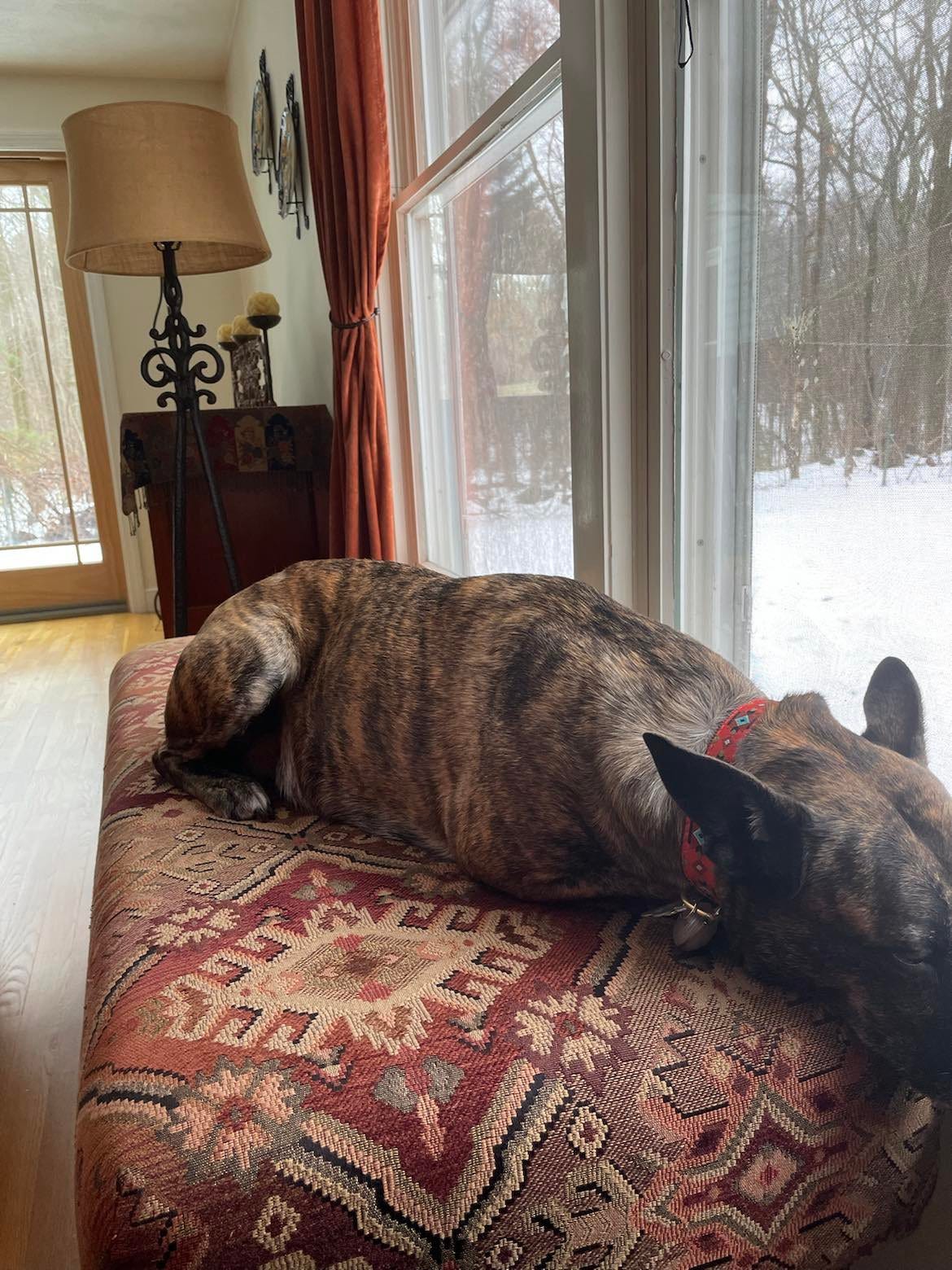“Just give her time,” says my spouse Janyce from the dining table. I’m sitting at the bird window with my cup of coffee in my lap on Saturday morning trying to calm myself down. I’m watching the puffed-up bluebirds squeeze themselves through the frozen caging to get at the bowl of peanut suet in the middle. I ventured out this morning onto the frigid ice slick that is the backyard in my pajamas, boots and coat to fill the glass bowl moments ago and they are at it now.
“But all we do is give her time,” I say. What I don’t say is, I’m really getting tired of YOU saying to ME, “give her time.”
This morning, our voiceless new rescue dog let out a loud yelp, the first one we’ve heard so far, after I maybe leaned onto her paw, I don’t even really know what happened. And this set off a chain reaction of scared, trembling, cowering dog who needed to be consoled and loved. Then there were two unsuccessful trips outside —that she initiated, mind you—with her running around the yard, crouching in desperate circles. She clearly needs to pee but she just won’t do it. She’s been with us almost three weeks now. Some days she’s totally fine and we think we’re making progress as she happily chews a bone on her chair, and plays with a squeak toy on the hallway rug. And other days something will spook her, and we’ll go all the way back to sad, sullen, voiceless dog.
Janyce has affectionately started to call her “spud,” because she spends so much time curled up and sleeping. I have affectionately started to call her “willful.” But I’m beginning to think it’s more me that is willful. I want her to become attached to us on my timeframe and not hers. I also want to get out of this house.
“Hey, you need to get a picture of the sun shining on the icy treetops up against the blue sky,” says Janyce. “It’s cold out, but it’s really beautiful.”
I’m standing at the kitchen stove frying an egg and some turkey bacon in a small nonstick frypan. Only the pan is no longer nonstick and why didn’t I swirl around some olive oil first? I start noisily hacking away with the side of my wooden spatula at the torn-up egg white while the yolk breaks and runs out in rivulets immediately sticking to the bottom. Janyce comes up behind me and puts her two hands on my shoulders.
“You just have to give it some time,” she says in a low voice very close to my ear. I swing around brandishing my useless wooden spatula with egg on it.
“You know what? You have got to stop saying that we need to give it some time, that I need to give it some time.” My voice has gotten louder and I’m not looking at her. I can’t see her face because I’m blinded now by the hot, flushed surface of my own. “When you’re raising kids, when they are babies, you can’t always say, ‘I just need to give this more time.’ Sometimes the kid has to go bed!”
“Okay, okay, I won’t say that any more. I thought that I was being helpful.”
“It’s not helpful. It actually sounds paternal,” I say.
“Okay, I’ll stop,” says Janyce.
She quietly walks away, scooping up her workout bands and foam roller, pointing her phone at the stereo receiver to switch on the music in the workout room downstairs. The Smashing Pumpkins start thumping up to the wood floor from down below. I walk away in the opposite direction, balancing my sad english muffin egg sandwich on a plate and look over at the dog lying on the bench at the bird window—her sullen chin pressed against the surface, and her snout just barely touching the glass.
The other morning, before we started working together on our laptops at the dining table, I read an article out loud.
“Did you know that the acronym LGBTQ+ has gotten significantly longer?” I said.
“How so?” said Janyce
“Well, it’s now LGBTQAI2S+ and has been that since 2018.”
“What is the 2S part? Can’t we just leave it at Queer and be done with it?” she said.
“I had that first reaction, too. But this part of the article changed my mind,” I said.
If terms change all the time, why bother with an update? Well they don’t all change, for one. But it’s also a question of respect: when you’re part of a group that’s been routinely defined by others throughout history — y’know, with homosexuality and being trans having been listed as mental illnesses until 1973 and 2013 respectively — you understandably might want to define yourself. When others refuse to use the words adopted collectively by our communities, it’s as though they’re telling us that they know better than us who we are. —Florence Ashley, Transfeminine jurist and bioethicist and doctoral student at the University of Toronto.
“It’s a little like saying, ‘All lives matter’ instead of ‘Black lives matter’ and missing the whole point,” I said.
“Ahh, I see what you mean,” she said.
We spent the better part of the pre-workday morning reading the article, discussing the terms and trying to locate our own identities that have been shifting for years now. I no longer call Janyce “my girl” because she has become more comfortable defining herself as non-binary. Neither one of us is lesbian or gay, either. I’m not her wife. She’s not mine. Basically, at the end of a long discussion we ended up mostly understanding our own privilege on another level. No matter what label we use or don’t use, our fluid experiences haven’t been all that difficult for us to deal with over the years, not like it can be for so many others.
“Where have I been all this time?” I said. “Wait, I can answer that: the mind-numbing after effects of the 2016 election, a global pandemic…”
“How about a cancer diagnosis?” she said.
“Oh right, yeah, that happened, too. It’s no wonder I feel so displaced, so far away from my true self these days.” I said.
At that moment, both of us looked over to our new dog, sleeping peacefully on the chair covered with the orange Harley Motorcycle blanket, her safe space.
“I’m glad we have an appointment with a fearful dog specialist on Sunday,” I said.
“How is everybody doing? says Janyce, post workout now and walking briskly past me while I’m still typing away on my computer. Our rescue dog, Selene, has been through so much. She lets out a long sigh, picks up her head for a minute, and then puts it right back down.
“She’s willful,” I say.
“She’s scared,” says Janyce.
“She’s a love,” I say.
“She’s my best girl, right spud?” says Janyce.
“She doesn’t even know what’s bothering her,” I say.
I guess we just have to give it more time.






this was lovely to read. And from the bottom of my heart thank you for giving a scared dog a home. There are so many of them out there and so many people who are looking for a transactional relationship from an animal and not fully understanding that they, like us, have lived experiences, some which are truly horrific. My guess is she will become the fiercest lover of the three of you in due time.